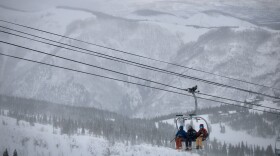-
States tasked with deciding the Colorado River's future have submitted competing proposals for how to manage the river's water. Environmental groups and tribes are also trying to help shape that conversation.
-
A new study from University of Colorado Boulder researchers finds a strong chance that precipitation will make the next two decades on the Colorado River wetter than the last.
-
‘If you are not at the table, you are on the menu:’ Tribes submit ideas to manage Colorado RiverA group of tribes that use Colorado River water sent a list of principles to the federal government amid contentious talks about how to share the shrinking supply.
-
Colorado's Rocky Mountains have reached peak snowpack, but climate change is changing the way snow turns to water. States around the region are debating new rules for the river that center around new water deficits.
-
Damage inside Glen Canyon Dam could mean problems with the "river outlet works," a set of small tubes near the bottom of the dam that were originally intended to release excess water when the reservoir is nearing full capacity. The dam allows water to pass through to the Colorado River and Grand Canyon.
-
A coalition of environmental groups has proposed a set of new rules for managing the Colorado River amid heated negotiations about how to share the water supply, which is shrinking due to climate changed.
-
The Gila River Indian Tribe (GRIC) in Arizona said it does not support the Lower Basin's proposal for post-2026 river management, adding a new layer to complicated negotiations.
-
The seven states that use water from the Colorado River have proposed competing plans for how it should be managed after 2026. Colorado, New Mexico, Utah, and Wyoming have one plan in mind. California, Arizona and Nevada have a different idea. The states primarily disagree about the how to account for climate change and how to release water from Lake Powell.
-
Water negotiators from states around the Southwest said they are planning to submit separate proposals to the Bureau of Reclamation about managing the Colorado River after 2026.
-
Dendrochronologists found that high temperatures in the 21st century make the current drought unprecedented compared to other dry periods around the Colorado River across the past 500 years.

Play Live Radio
Next Up:
0:00
0:00
Available On Air Stations










